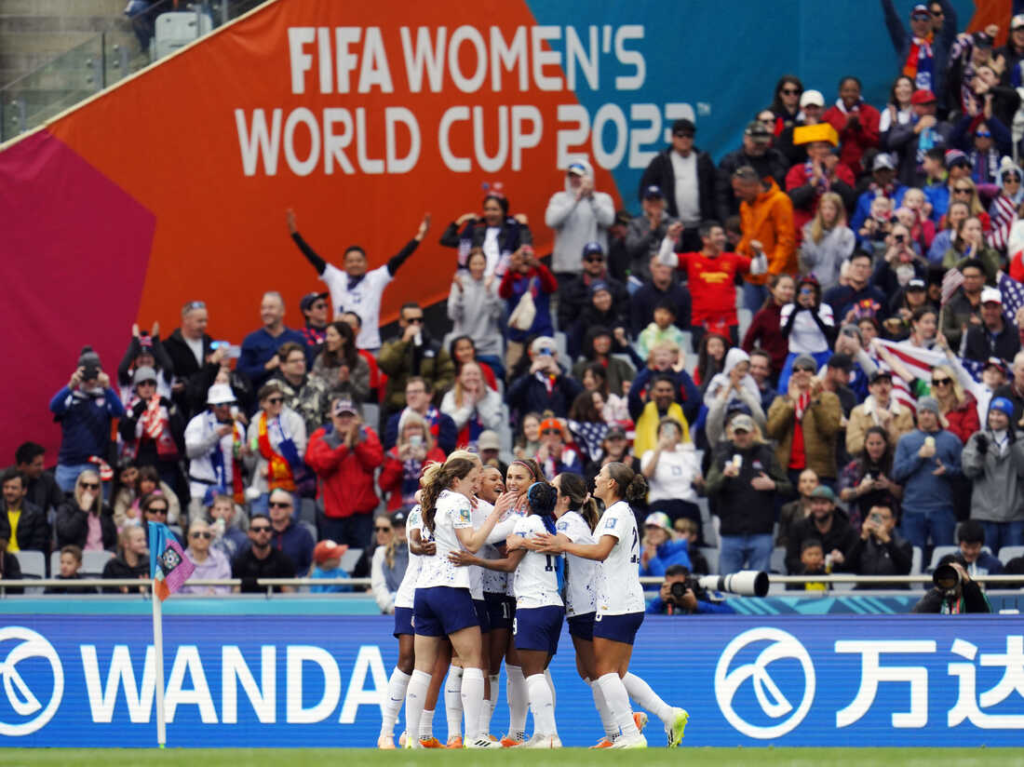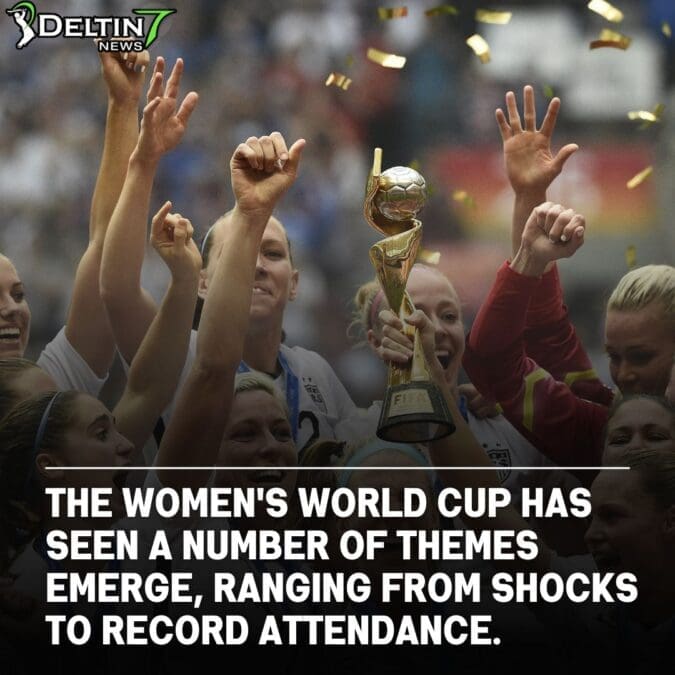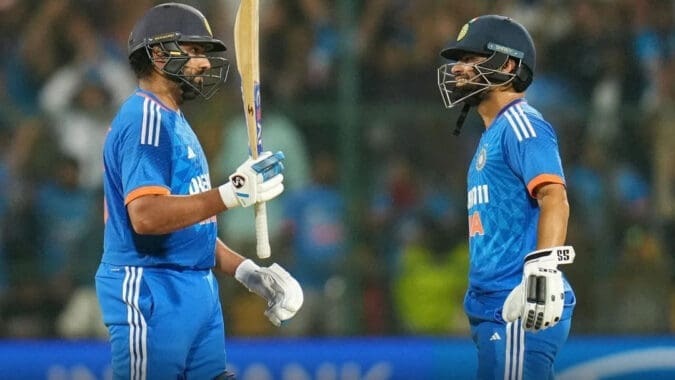
The Women’s World Cup has seen a number of themes emerge, ranging from shocks to record attendance
The competition, which is being co-hosted by Australia and New Zealand, has been full of surprises.
This has been the standout theme of a tournament that has already broken records for attendance and goals scored as it progresses into the quarterfinals. It has created a highly dramatic atmosphere.
“The success of this World Cup truly exceeds expectations and serves as a powerful validation for the efforts being made in women’s football worldwide,” said Sarai Bareman, FIFA’s head of women’s football, in an interview with The Associated Press. “Witnessing the impact and results of this tournament reinforces the significance of our work.”
“The growth and impact of the women’s game in soccer is truly remarkable. It’s not just special for the players and teams involved, but also for those of us who work tirelessly behind the scenes day in and day out.” FIFA, the world governing body for soccer, has been actively working to promote and develop the women’s game, and their efforts are starting to show significant results.
Over the past two weeks, several established nations in women’s soccer have unexpectedly been eliminated from the competition. This includes back-to-back defending champion U.S. team, No. 2-ranked Germany, Brazil, and even Olympic gold medalist Canada, all departing the tournament earlier than anticipated.
The United States team’s hopes for an unprecedented third consecutive World Cup title were dashed when they lost to Sweden in a penalty shootout during the round of 16. Lina Hurtig’s spot kick just barely crossed the line, sealing victory for Sweden and leaving the pre-tournament favorites stunned. This unexpected outcome has raised doubts about the future of U.S. soccer.
Germany, a two-time champion, had an impressive start with a 6-0 victory over Morocco. However, they faced setbacks as they were defeated by Colombia and held to a draw by South Korea in the group stage. Similarly, Brazil began their journey with a convincing 4-0 win against Panama but experienced defeats against France and drew with Jamaica. Unfortunately, both Germany and Brazil failed to advance to the knockout stage.
Morocco, South Africa, Jamaica, and Colombia, all newcomers to the tournament, have advanced. Among them, Colombia is the only team from the Americas still in contention. In the quarterfinals, they will face England after narrowly defeating Jamaica 1-0 in the round of 16.
“This World Cup has been truly remarkable. It’s evident that the level of competition is becoming more balanced between smaller and bigger nations,” expressed Bunny Shaw, a forward from Jamaica’s Manchester City. “Women’s football is expanding and progressing, and it’s crucial that we continue to move forward and push for further growth.” The question now is whether these surprising outcomes are simply a result of this year’s tournament in the Southern Hemisphere or a lasting trend in women’s football.”
GOALKEEPING ENHANCEMENTS
In the round of 16, the American team faced a formidable obstacle in Sweden’s goalkeeper, Zecira Musovic. Despite dominating the game, the U.S. was unable to score due to Musovic’s exceptional performance. Her outstanding saves earned her the title of player of the match in a game that ended in a 0-0 draw even after extra time.
Daphne van Domselaar, the goalkeeper for the Netherlands, stood out as the player of the match during their 2-0 victory over South Africa in the round of 16. Although South African keeper Kaylin Swart made a crucial mistake that led to Lineth Beerensteyn’s goal, she also made several impressive saves to keep the Netherlands from scoring more.
In a scoreless opening draw, Nigeria’s captain, Chiamaka Nnadozie, made a crucial save that prevented Canada’s Christine Sinclair from making history. For her impressive performance, Nnadozie was awarded the player of the match accolades.
Former Germany goalkeeper Nadine Angerer, who is part of FIFA’s technical study group at the World Cup, expressed a cautiously optimistic perspective, acknowledging that while things aren’t perfect, she believes that progress is being made in the right direction.
“We have observed a noticeable improvement in goalkeeping performances overall. According to Angerer, the save percentage during the group stage increased from 70% in 2019 to an impressive 77%.”
NOT EVERYTHING IS ABOUT POSSESSION
The tactical improvement of less-established teams has been as highlight.
Despite having fewer star players, these teams have still managed to be effective even if they have had to give up possession.
Jamaica employed a strategic approach that allowed them to progress from a challenging group featuring France and Brazil, managing to keep their opponents from scoring. Unfortunately, they were ultimately knocked out by Colombia with a narrow 1-0 defeat.
“When entering a game, there’s often a decision to be made: do I want possession of the ball or do I want the opponent to have it?” explained Jill Ellis, former coach of the U.S. national team. “If I choose to let my opponent have the ball, it’s because I want them to open up and create opportunities for me to exploit in transition.” While teams like Japan and Spain prioritize maintaining possession, Colombia has found success with their quick counter-attacks.”
“You’re seeing the distinct characteristics and strengths of different nations shine through,” commented Ellis. “Rather than trying to fit a specific style, teams are focusing on leveraging their own unique advantages. I’m noticing this trend more in the current World Cup.”
TIME EXTENDED
Time-wasting was a notable aspect of the men’s World Cup in Qatar last year, and FIFA is taking measures to address and reduce it.
Games often extend beyond the typical 90-minute regulation time with frequent occurrences of lengthy periods of stoppage time.
Although major domestic leagues didn’t continue the initiative after Qatar, the Premier League seems determined to carry it forward this season. In the Community Shield match on Sunday, Arsenal managed to score an equalizer in the 11th minute of stoppage time against Manchester City and went on to win in a penalty shootout.
INTEREST IS INCREASING
The Women’s World Cup has been pulling in the fans.
Australia has had the opportunity to play in front of massive crowds exceeding 75,000 people on two occasions in Sydney. The only limitation was the capacity of the stadium.
The current attendance for the first two rounds of the World Cup has already surpassed the previous record of 1.35 million set during the tournament held in Canada in 2015. A total of 1,533,545 fans have attended the games so far.
Despite the tournament now featuring 32 teams instead of 24, the high attendance numbers of over 40,000 people at 14 games during the first two rounds clearly indicate the immense popularity of this event.
According to FIFA president Gianni Infantino, the Women’s World Cup has transformed from being a tournament supported mainly by teams to becoming a globally followed event. This shift is what has made this edition of the tournament the greatest one yet, breaking numerous records.











